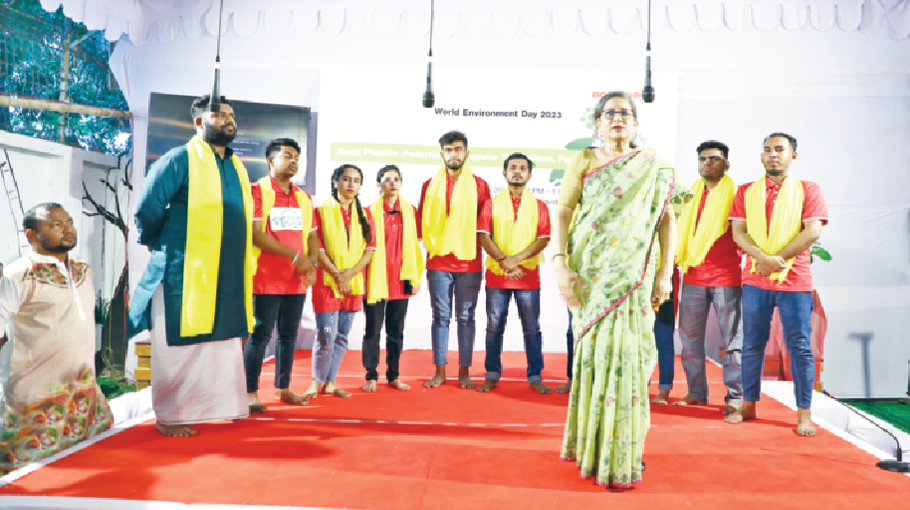Call for urgent actions to address plastic crisis


ActionAid Bangladesh celebrated the World Environment Day-2023 on Monday (June 5) with a special event focused on the participation and role of young people in environmental activism in Global Platform Bangladesh office.
Speakers in the event called for urgent actions to address the global plastic crisis, echoing with this year theme ‘Beat Plastic Pollution’.The event shed light on the importance of transitioning from fossil fuels to renewable energy sources to combat global warming and reduce greenhouse gas emissions.
In her opening remarks, Farah Kabir, Country Director of ActionAid Bangladesh; said, “We must unite in our commitment to protect and preserve our environment for the well-being of current and future generations. It sometimes feels like we live in a parallel world. On the one hand, we are celebrating World Environment Day to raise awareness, and on the other hand, we are cutting down trees for beautification. We need greater synergy to build a world where clean energy powers our economies and sustainable practices become the norm.”
She further said that youth must be in the forefront of efforts to combat plastic pollution, spearhead the energy transition, and create a sustainable environment for future generations.
The event was addressed, among others, by Nayoka Martinez Backstrom, Deputy Head of Development Section, Embassy of Sweden; M Zakir Hossain Khan, Lead Researcher at Change Initiative; Dr. Haseeb Md. Irfanullah, Independent Consultant in Environment, Climate Change & Research System; Dr. Shahriar Hossain, Secretary General of Environment and Social Development Organization and Miraj Ahmed Chowdhury, Board Member, ActionAid International Bangladesh Society.
“We need to move away from the concept of recycling and rather transition towards refuse, reduce, reuse and refill strategy”, opined Dr. Shahriar Hossain.
Dr. Haseeb Md. Irfanullah said, “We need to start talking about nature-based solution finance and establish an information repository for stronger coordination among the different stakeholders.”.
“We might believe that plastic makes our lives easier, but it comes at a high cost. It provides short-term solutions, but in the long run, it is harmful. Plastic is present in my blood, the air I breathe, my food, and my water. How much more of it? We need to urgently stop using plastic,” opined Aruba Faruque.
The event also included an open discussion and Q&A session, allowing young participants to engage in conversations about plastic pollution, fossil fuel use, energy transition, climate budget tagging, environmental activism, and the role of youth.
The budget of fiscal year 2023-2024 suggests raising the value-added tax (VAT) on plastic home items such cookware, tableware, and hygiene products from 5% to 7.5%. Although this is a start in the right direction toward minimizing the use of plastic, the budget's lack of any mention of curbs on single-use plastic is contradictory, speakers opined.
In addition, the discussion also highlighted that, as we advocate for behavioral change to shift from single plastic use to renewables, there needs to be available alternatives in the market. The introduction of Sonali bags or jute bags could have been an alternative, but at present we are not seeing their widespread use in the country. This raises the question of whether it was a one-time initiative.
Stating World Bank Report of 2021 speakers said, from 2005 to 2020, urban Bangladeshi plastic use per head increased from 3.0 to 9.0 kg per year. In 2020 alone, we used 977,000 tons of plastic, but only 31 per cent of that was recycled. As the government of Bangladesh emphasizes on creating Smart and digital Bangladesh, time has come to question how as citizens we are taking steps? Are we working as smart citizens and taking adequate steps to ensure a just and green world?
Effective enforcement of plastic-related legislation and promoting positive behavioral shifts are crucial factors in combating plastic pollution. It is imperative to explore viable alternatives to plastic in various applications, ensuring their widespread adoption and encouraging environmentally conscious entrepreneurship, speakers further added.
Speakers also urged for strengthening networking among young people and multiple stakeholders while sensitizing them to environmental concerns and encouraging them to take steps to reduce plastic consumption in their daily lives.
In addition to knowledge sharing and discussions, youth representatives staged a theatrical performance, showcasing their activism against plastic pollution.



